|
|
|
Sort Order |
|
|
|
Items / Page
|
|
|
|
|
|
|
| Srl | Item |
| 1 |
ID:
094561
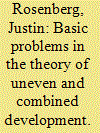

|
|
|
|
|
| Publication |
2010.
|
| Summary/Abstract |
Where does 'the international' come from? What accounts for its existence as a dimension of the human world? This article attempts an answer, in three steps, using the idea of 'uneven and combined development' (U&CD). First, a depth model is constructed, comparing different ways of linking uneven development with international relations. Thus far, it turns out, these ways have all presupposed the fact of political multiplicity, rather than explaining it. In search of explanation, the article turns, secondly, to the compelling historical sociological argument of Barry Buzan and Richard Little. This locates the origins of geopolitics in the late prehistoric shift from hunter-gatherer to settled agricultural existence, together with associated processes of social differentiation and proto-state formation. Buzan and Little's explanation appears at first to pre-empt the need for the concept of U&CD. Yet closer inspection reveals that unevenness and combination play a key role in their empirical account without, however, being theorized. The third step of the argument therefore seeks to show how these are necessary parts of the process of social change which Buzan and Little describe. And in this way it emerges that the origins of 'the international' do indeed lie in the uneven and combined character of historical development.
|
|
|
|
|
|
|
|
|
|
|
|
|
|
|
|
| 2 |
ID:
094560
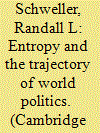

|
|
|
|
|
| Publication |
2010.
|
| Summary/Abstract |
The random and indeterminate nature of the current unipolar world suggests a condition of increasing entropy. There are two reasons for this claim. First, relative capability advantages under unipolarity do not translate as easily as they once did into power and influence over others. Second, systemic constraint is a property that limits actors' freedom of action by imposing costs and benefits on certain kinds of actions. Unlike past multipolar and bipolar systems, the current unipolar system exerts only weak, if any, systemic constraints on the unipolar power and all other actors as well. Thus, polarity has become a largely meaningless concept. Today, system process rather than structure best explains international politics, and this process is one of entropy. Finally, I suggest two pathways from unipolarity to a more balanced system: one is fairly consistent with standard balance-of-power realism but adds an ideational component; the other restores equilibrium by means of entropy.
|
|
|
|
|
|
|
|
|
|
|
|
|
|
|
|
| 3 |
ID:
094554
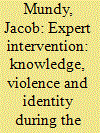

|
|
|
|
|
| Publication |
2010.
|
| Summary/Abstract |
Civil wars and humanitarian intervention became two of the most dominant security concerns of the 1990s and Algeria was one of the many sites where these discourses were played out, especially during the wave of massacres that claimed the lives of hundreds (if not thousands) of Algerian civilians between mid-1997 and early 1998. The internationalization of the Algerian Civil War was driven as much by the horrific violence as by a lack of certainty as to the identity of those perpetrating the massacres. The indeterminacy of violence in Algeria provided the warrant for experts to fill the void. Yet interpretations of the violence in Algeria, coupled with the generic logics of intra-national armed conflicts and the use of international coercive force for the protection of human rights, produced divergent problematizations of the crisis. This paper thus examines the ways in which Algeria was, and often was not, produced as a civil war and a humanitarian crisis by expert and scholarly knowledge and practice. Through an analysis of the exclusionary effects of the dominant understandings of political violence in Algeria, we are able to understand the conceptual impasse that faced international action against the massacres.
|
|
|
|
|
|
|
|
|
|
|
|
|
|
|
|
| 4 |
ID:
094559
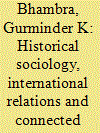

|
|
|
|
|
| Publication |
2010.
|
| Summary/Abstract |
This article addresses three recent developments in historical sociology: (1) neo-Weberian historical sociology within International Relations; (2) the 'civilizational analysis' approach utilized by scholars of 'multiple modernities'; and (3) the 'third wave' cultural turn in US historical sociology. These developments are responses to problems identified within earlier forms of historical sociology, but it is suggested each fails to resolve them precisely because each remains contained within the methodological framework of historical sociology as initially conceived. It is argued that their common problem lies in the utilization of 'ideal types' as the basis for sociohistorical analysis. This necessarily has the effect of abstracting a set of particular relations from their wider connections and has the further effect of suggesting sui generis endogenous processes as integral to these relations. In this way, each of the three developments continues the Eurocentrism typical of earlier approaches. The article concludes with a call for 'connected histories' to provide a more adequate methodological and substantive basis for an historical sociology appropriate to calls for a properly global historical sociology.
|
|
|
|
|
|
|
|
|
|
|
|
|
|
|
|
| 5 |
ID:
094557


|
|
|
|
|
| Publication |
2010.
|
| Summary/Abstract |
The critique of methodological nationalism arose in the 1970s in sociology, but it only gained salience with the rise of globalization theory in the late 1990s. This article argues that in International Relations the discussion of the so-called 'domestic analogy' is closely connected to the one on methodological nationalism as they equally point to the substantive problem of understanding the nation state's position in modernity. The first section of this article revisits the three waves of the debate on methodological nationalism in sociology. The second part connects this with the discussion in IR on the domestic analogy. The last section brings the two disciplinary strands together by suggesting that social theory's claim to universalism is a fundamental resource to theorize current global processes beyond methodological nationalism and the domestic analogy. But for us to do so, we still have to unpack social theory's ambivalent relationship with the natural law tradition.
|
|
|
|
|
|
|
|
|
|
|
|
|
|
|
|
| 6 |
ID:
094555
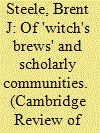

|
|
|
|
|
| Publication |
2010.
|
| Summary/Abstract |
In a series of lectures in the early 1980s, Michel Foucault resurrected the Greek word for frankness or truth-telling-'parrhesia'-to investigate the inter-relationships and tensions that existed between freedom, truth-telling and political power. He concluded that in order for one to 'tell the truth' against a powerful superior, one needs the courage to oppose a community of which the parrhesiastes ('truth teller') is a member. This paper uses parrhesia to investigate the practice of the international relations (IR) scholar in speaking out against his or her scholarly community. Tony Smith's 2007 book Pact with the devil is used as an example of academic-intellectual parrhesia not only to illustrate the content of a potential form of parrhesia, but to demonstrate the challenges IR scholars who wish to practise academic parrhesia face in criticizing members of their academic community. Smith's critique of democratic peace theory specifically, and liberal IR theory more generally, is particularly noteworthy considering Smith's former position as a leading liberal proponent. The paper reviews, and then supplements and extends, Smith's critique of democratic peace theory.
|
|
|
|
|
|
|
|
|
|
|
|
|
|
|
|
| 7 |
ID:
094556
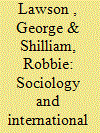

|
|
|
|
|
| Publication |
2010.
|
| Summary/Abstract |
While sociological concepts have often been implicitly used in International Relations (IR), recent years have seen a more explicit engagement between IR and Sociology. As with any such interdisciplinary assignation, there are both possibilities and challenges contained within this move: possibilities in terms of reducing IR's intellectual autism and opening the discipline towards potentially fertile terrain that was never, actually, that distant; challenges in that interdisciplinary raiding parties can often serve as pseudonyms for cannibalism, shallowness and dilettantism. This forum reviews the sociological turn in IR and interrogates it from a novel vantage point-how sociologists themselves approach IR concepts, debates and issues. Three sociological approaches-classical social theory, historical sociology and Foucauldian analysis-are critically deployed to illuminate IR concerns. In this way, the forum offers the possibility of (re)establishing exchanges between the two disciplines premised on a firmer grasp of social theory itself. The result is a potentially more fruitful sociological turn, one with significant benefits for IR as a whole.
|
|
|
|
|
|
|
|
|
|
|
|
|
|
|
|
| 8 |
ID:
094553
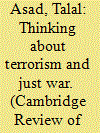

|
|
|
|
|
| Publication |
2010.
|
| Summary/Abstract |
Since 2001 a new urge to moralize the use of violence as an instrument of state policy has appeared in liberal democracies. The American idea of a War against Terror, and the European notion of confronting a global terrorist threat, have together merged with a discourse on humanitarian military action: the political/moral 'responsibility to protect' is no longer to be confined to one's own citizens. Renewed interest among academics in 'just war' theory, the tradition that seeks to humanize war through law, reflects this development. This article questions the assumption that there is an essential difference between war (civilized violence) and terrorism (barbaric violence). It argues that their similarity appears more clearly if we set intentions aside-such as the deliberate or accidental killing of 'innocents'-and focus instead on three main facts: (a) modern war strategies and technologies are uniquely destructive, (b) armed hostilities increasingly occupy a single space of violence in which war and peace are not clearly demarcated, and (c) the law of war does not provide a set of 'civilizing' rules but a language for legal/moral argument in which the use of punitive violence is itself a central semantic element.
|
|
|
|
|
|
|
|
|
|
|
|
|
|
|
|
| 9 |
ID:
094558
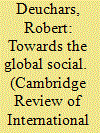

|
|
|
|
|
| Publication |
2010.
|
| Summary/Abstract |
This article explores the relationship between contemporary forms of governance and risk. International Relations scholarship tends to locate governance within a theoretical framework derived from sovereignty. I suggest that a Foucauldian notion of 'governmentality' entails a better understanding of modes of governance, especially in so-called advanced liberal societies. In these societies, a particular form of rationality and a series of invasive techniques render individuals as objectified, classified and calculable things, in turn, making them more amenable to risk-based technologies of control. Via a survey of credit-rating, auditing, insuring and other calculative practices, I examine that ways in which governance operates as a biopolitical technology. This clears the way for thinking about governance in terms of the 'global social'.
|
|
|
|
|
|
|
|
|
|
|
|
|
|
|
|
|
|
|
|
|